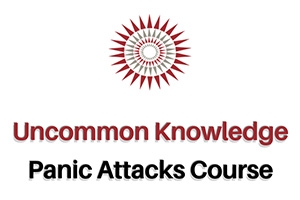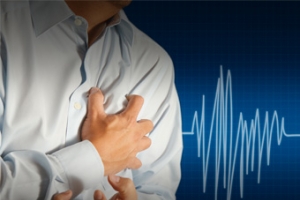5 Ways to Slow Your Heart Rate During Anxiety or a Panic Attack
Plus anxiety first aid you can use right now
"I grew louder - louder every moment!"
- from The Tell-Tale Heart by Edgar Allan Poe
If you're feeling highly anxious right now, you're going to find it hard to read information and take it in. If this is the case, listen to 'Anxiety First Aid' now, then come back and read the article.
Panicking right now? Listen to our first aid audio below:
![]()
If you're anxious just now, listen to the audio below (as long as you're not in a situation where you need to maintain concentration) or download it here.
There it goes again: boom, boom, boom. You become horribly aware of your heart, racing like an untethered wagon down a steep mountain track. So out of control it seems; so unnaturally fast. Surely something's going to snap!
Here I want to reassure you about the fast heartbeat that can be associated with stress and anxiety, and give you five tips to quickly slow your heart rate to a normal speed.
If you worry about a racing heart during anxiety or panic, you're not alone.
Prefer to watch instead?
Are you panicking about your panic?
If I had a gold bar for every time an anxious client described how their heart races and rattles, pounds and pumps, faster and faster, at the onset of panic, I'd give Fort Knox a run for its money. In fact, for many a speeding pulse is panic.
Or at least, the sudden speeding of the heartbeat is one of the first dramatic signs of panic and anxiety. What's more, this very symptom of anxiety can make us panic more. People panic about their panic.
"I can almost hear my own heart beating, and I think other people must be able to hear it too!" one client told me in a distant echo of Poe's famous horror tale.
Another told me forlornly how she felt her heart rate became so quick it would sort of 'come off the rails', like a train coming off its tracks. She also worried her heart wouldn't be able to take it.
No wonder a common belief during a panic attack - certainly the first time it happens - is "I'm going to die!" or "I'm going crazy!"
And yet a raised pulse is entirely natural in these kinds of situations. Which is not to say we shouldn't try to slow it down!
I'm going to tell you why and how you can start to slow it down, easily and comfortably. Many find that hypnosis for anxiety can be a quick and effective natural treatment and if you ever need it, there's even a 'first aid' audio you can listen to on this very page to help bring down your heart rate and get you feeling calm.
So why does the heart speed up when we get scared?
Anxiety, or an inappropriate exercise response?
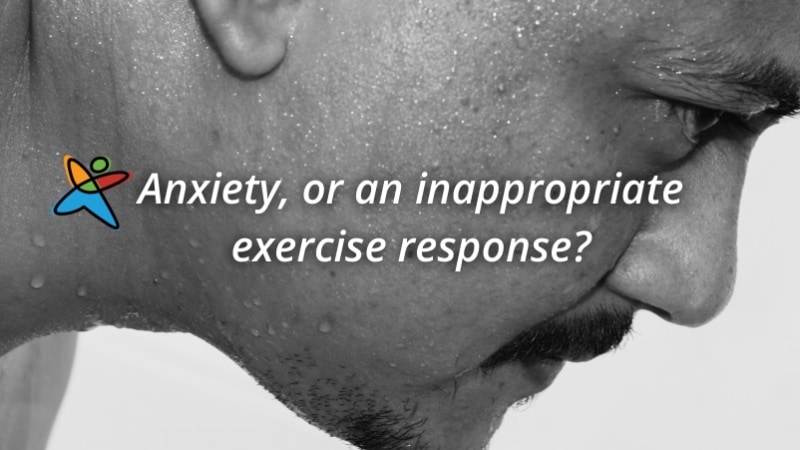
Fast heart rate; quick, shallow breaths; sweating; dry mouth; and blood pumped away from the stomach and into the major muscles. All these are symptoms of panic, but also of exercise.
If your pulse rate is fast, your breathing is quick and shallow, and you're sweating while at the gym running on a treadmill, well, that's what you expect to feel when you exercise.
If you're sprinting hard, it won't feel weird that you're breathing fast and your pulse rate is right up. If, on the other hand, you're in a meeting and your body is acting like you're exercising when you're not, well, that's gonna feel very weird. Not to mention uncomfortable.
Forget the idea of a panic attack for a moment. I don't like the metaphor of 'attack' when talking about panic. In reality, the fight-or-flight response is about producing all the characteristics of exercise.
When you consciously or subconsciously feel something is a threat, then your body starts to act like you're exercising because it is anticipating that you're going to need to exercise - that is, to fight or flee - very soon!
This is all very well if you're being chased by a mugger, but not, of course, when you're about to present to a hundred co-workers.
Controlling your heart rate and stopping panic attacks (read: inappropriate exercise responses!)is really about teaching your body, "No, thank you, heavy exercise will not be needed right now!"
Hypnosis is an excellent way to lower stress, and when you're generally calmer you'll find it actually takes a lot more to make you panic. But there are things you can do right away to lower and control your heart rate, and therefore feel so much calmer.
Tip one: Breathe your way back to calm
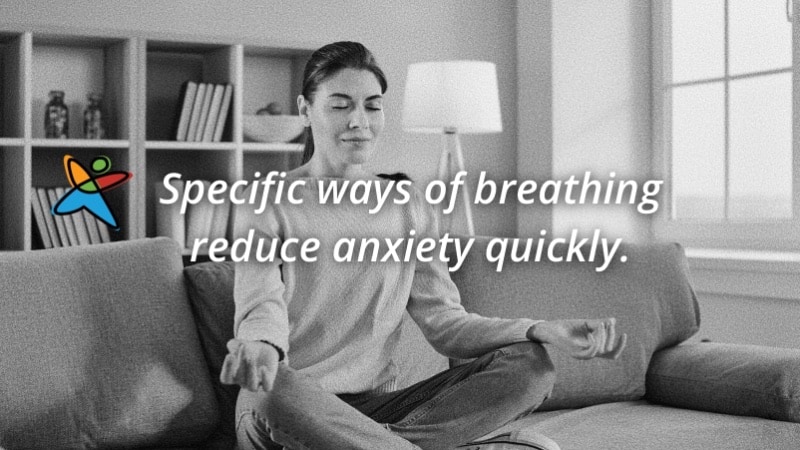
Psychologists have discovered that the symptoms of a panic attack (inappropriate exercise response!) start up to an hour before you even become aware of anxiety.1 The panic may seem to 'come from nowhere', but actually it doesn't.
One of the first changes before conscious panic sets in is a change in breath. Breathing starts to become shallower (in expectation of the need to exercise), and heart rate increases.
A certain breathing technique called 7/11 breathing will help you put the brakes on panic and slow your heart rate almost instantly.
Breathe in through your nose to the count of 7 (quick counts, not seconds) and out through your nose to the count of 11. The outbreath puts the brakes on anxiety and calms you down rapidly. If you prefer, you can breathe in to 5 and out to 7.
And remember, you can use our 7/11 hypnosis audio session any time you want to calm right down - or even on a daily basis.
If you intentionally breathe like this every so often throughout the day, you'll start to feel generally calmer. And if you start to breathe like this as soon as you notice your heart rate increasing, you'll soon slow it right down.
The next tip is also pretty simple.
Tip two: Remind yourself you can change the way you feel
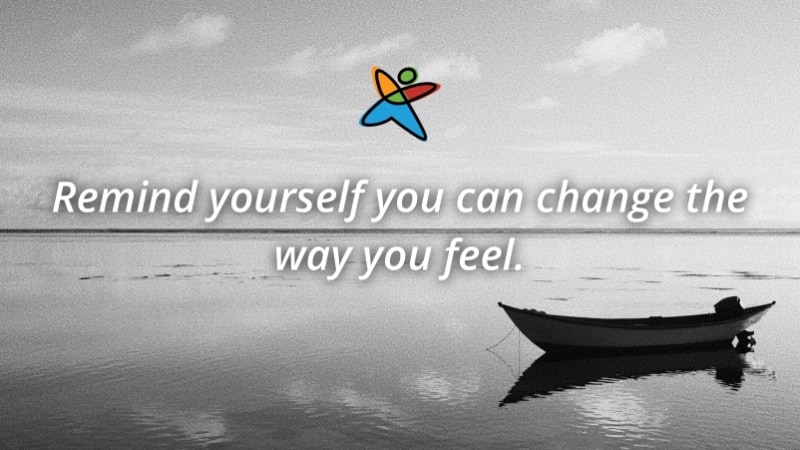
Research has found that the biggest influence on whether someone is able to change their state of mind (and therefore body) is whether they believe they can do it.2 When you notice your heart rate rising rapidly, it's easy to feel as if it's happening to you and that you have no control.
And this does seem perfectly reasonable, since it's your autonomic nervous system - which is controlled by your unconscious mind - that is producing the change. No one consciously decides to panic. Yet we know that simple measures, like the ones you're learning here, can help you change your state back to one of comfort fast.
So simply remind yourself, "There is plenty I can do to slow things down here!" We don't have to just be victims of our unconscious processes, especially if we can learn to better use our minds to influence our bodies.
The next tip is almost absurdly simple. And however unlikely it seems, it has actually been found to be effective.
Tip three: Splash cold water onto your face
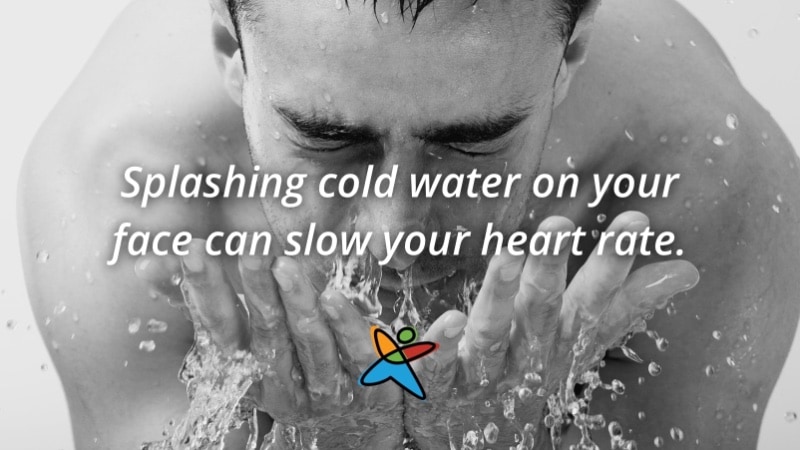
Yes, you read me right, and no, I haven't taken leave of my senses (I hope!).
Cold water exposure has been found to increase feelings of calm and wellbeing and slow heart rate.3 It does this by stimulating what's known as your vagus nerve. Your vagus nerve controls autonomic (unconscious) responses such as the fight-or-flight response (which, as we know, is essential in case of real, physical emergency). And stimulating this nerve can help calm you right down and slow your heart rate fast.
I'm not suggesting if you notice your heart rate rising you should go jump in a cold lake! But simply taking the time to splash cold water onto your face should help slow everything down. Of course, self-hypnosis and 7/11 breathing also wonderfully stimulate the vagus nerve.
Talking of which...
Tip four: Use self-hypnosis
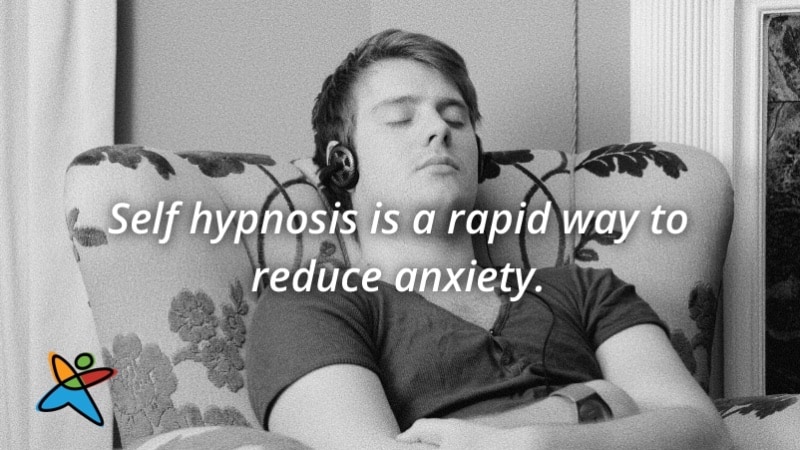
Hypnosis is a practical and enjoyable way to take more control of unconscious processes like heart rate, giving you more confidence in your ability to calm down quickly. What's more, once you've used hypnosis a few times, it becomes easier to use it when you really need to take control of what's happening in your mind and body.
Hypnosis and mindfulness meditation can certainly help to normalize heart rate in the moment, but also over the longer term.4
And high-quality Uncommon Hypnosis can be used to maximize the benefits of mind/body control.
Tip five: Use mindful hypnosis
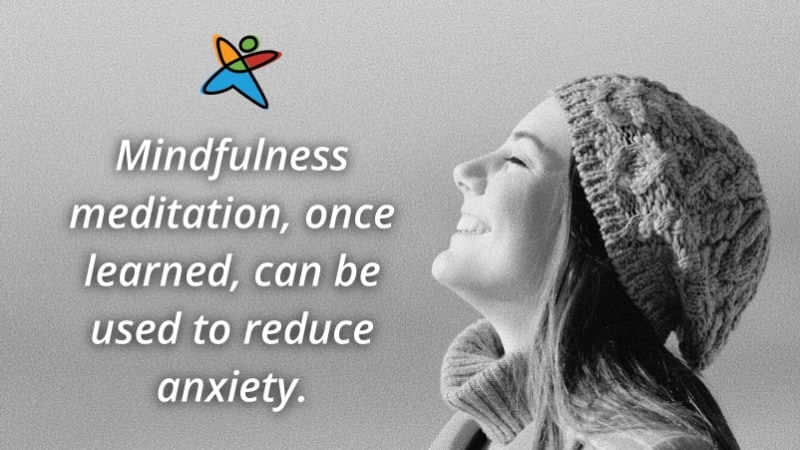
Mindfulness is all about staying in the here and now, without labelling things as good or bad. It's a state of being where you don't get caught up in your thoughts and emotions, but rather just watch them and then let them go.
It's like stepping back and observing your thoughts, feelings, and sensations from a distance. It means inhabiting the observing self, a term familiar to all Uncommon Practitioners, so that thoughts, feelings, and sensations are watched from afar.
Calm detachment is often an element of meditation and other hypnotic-like techniques, and also many wisdom traditions in which the aspirant needs to understand themselves better.
When we calmly observe our experience in a purposefully detached way, we find we can start to influence our own experience much more easily. One client, after using hypnosis, told me if ever she started to stress out, she could feel as though she were outside of it 'in a good way' and could simply dial down her stress levels (which then normalized her heart rate and breathing).
So these are a few ways to lower heart rate in the moment. But I want to offer a caveat.
If in doubt, get checked out
It feels scary to have your body acting as though you're undertaking heavy exercise when you're not simply because your unconscious mind has wrongly tagged some situation as physically threatening. Anxiety is a full-body response and therefore feels dramatic in the body. So there's every chance your racing, pounding heart is just in the midst of a normal (albeit inappropriate!) exercise response.
But! It's always a good idea to get medically checked out if you're worried about your heart health. If in doubt, always get checked out - but remember, anxiety can:
- increase heart rate (I think we've established that!)
- cause shortness of breath
- bring on dizziness
- make you sweat 'buckets'
- bring on 'pins and needles'
- cause digestive symptoms.
We can and should use the mind to alter the body's anxiety response, but - I'll say it again! - if you're worried about your heart rate or health, see a doctor.
Lifestyle heart-rate helpers
Beyond learning to influence your body directly though self-hypnotic methods, there are also longer-term ways to regulate and normalize heart rate, which are worth at least thinking about.
There are many sensible ways to help ensure your heart rate stays within normal limits, from limiting caffeine, alcohol, and nicotine consumption to exercising regularly, sleeping well, relaxing regularly, and staying hydrated.
It's also been found that spending time in nature has a calming effect: just 20 to 30 minutes a week is enough to bring down overall stress levels.5 If I can't get out in nature I find listening to this forest relaxation session gives me the relaxation effects of being in a beautiful forest.
Knowing how to regain calm is such a wonderful resource.
Remember, your body is always seeking to return to balance - and you can help it do that.
I also want you to remember above all that there are things you can do, in the moment and the longer term, to gain control and peace of mind.

Get a free hypnosis session with our new Overcome Anxiety app for iPhone & Android
Includes our most popular anxiety treatment session free, with the option to upgrade to 10 more sessions.
Get the Overcome Anxiety Hypnosis app for iOS (iPhone or iPad) here or for Android here.
References
- Meuret, A. E., Rosenfield, D., Wilhelm, F. H., Zhou, E., Conrad, A., Ritz, T., & Roth, W. T. (2011). Do unexpected panic attacks occur spontaneously?. Biological psychiatry, 70(10), 985-991.
- Catanzaro, S. J., & Greenwood, G. (1994). Expectancies for negative mood regulation, coping, and dysphoria among college students. Journal of Counseling Psychology, 41(1), 34.
- Jungmann, M., Vencatachellum, S., Van Ryckeghem, D., & Vögele, C. (2018). Effects of cold stimulation on cardiac-vagal activation in healthy participants: randomized controlled trial. JMIR formative research, 2(2), e10257.
- Yüksel, R., Ozcan, O., & Dane, S. (2013). The effects of hypnosis on heart rate variability. International Journal of Clinical and Experimental Hypnosis, 61(2), 162-171.
- Meredith, G. R., Rakow, D. A., Eldermire, E. R., Madsen, C. G., Shelley, S. P., & Sachs, N. A. (2020). Minimum time dose in nature to positively impact the mental health of college-aged students, and how to measure it: A scoping review. Frontiers in Psychology, 2942.




